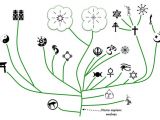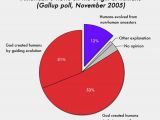Even when I was but a little boy, I had respect for science. The people in my family have it as well, with them being engineers and doctors and whatnot. They may not have agreed that evolution is the way humans evolved, but they were in doubt on this matter, especially my doctor mother. She believes in God, but cannot dismiss the mountain of evidence that supports Darwin's theory. So she found herself in a bit of an awkward situation whenever I asked her about this sort of things. But the bottom line is that, even though disagreement existed, the general idea in the family was that science was good, and, as such, everyone had respect for it.
This is certainly no longer the case today, especially in more developed countries. The leader in disbelief is the United States of America. Levels of scientific acceptance here are very low. Maybe this happens because the level of education in the country has plummeted over the past 15 years or so, and because scientific literacy rates are appallingly low. The US is no longer a leader of the scientific community through its own citizens alone.
A quick look on the Science section on Softpedia will reveal a large number of Asian and Indian researchers leading the way in breakthroughs in various fields. That is not to say that I have something against them, or that I am implying that American experts are not in fact experts. Far from me to say this, I am merely pointing out a shift in the overall trends. Having said that, you should also consider the fact that statistics show very low high school science knowledge rates. That is, basic science.
On such a background, the trend that more and more Americans have, of arguing that every new study that comes out (and disagrees with what they believe), is pseudo-science. I get the distinct impression that many of the people using these words, in comments sections here and on other sites or public forums and discussion boards, do not really know what they mean. They think that it sounds good to say it, and that they appear more intelligent for using that.
If you want clear examples of this, search the Internet for articles on global warming. You will be treated to a display on comments by users who thoroughly and utterly dismiss literally hundreds of scientific studies in favor of just one. The investigations conducted by the largest research institutes and universities in the world, and by leading scientists in their respective fields, are called bogus, biased, and misleading, and counter-examples are given.
If, for example, one professor from MIT, or a NASA scientist, says that global warming isn't real, then critics have a field day with that statement. It may be taken out of context, or it may be exactly what that expert believes, but almost every article presenting research on global warming gets at least one or two comments screaming that “this MIT researcher said that” and “the NASA study showed that.” This may lead some of those who are the least informed in the “audience” to reconsider their position.
However, if you were to search for officially published studies from NASA or MIT, taken from peer-reviewed, prestigious scientific journal, you would soon find out that the opinion of that sole researcher is in fact not shared by the studies he may have co-authored or referenced. In other words, NASA is one of the leading agencies that draws attention to the perils of global warming, simply because it has the most extensive capabilities of actually conducting studies on the matter.
Its satellites have been surveying the Arctic, the Antarctic, and the Greenland ice sheets for decades, and their time-lapse videos of the trends recorded over the last 30 to 35 years show a reduction trend clearly. Still, documents appear on the Internet and in obscure journals, showing that the Antarctic is cooling, which is false. Its Eastern part has for a while remained stable, but that is not evidence of recovery by a long shot. The Western part is, however, a complete mess.
Even when confronted with video evidence, pictures, graphs and other evidence, many scream “pseudo-science.” And this stems from either one of two things. Either they play the agenda of large oil companies, and of those who have an invested interest in human kind not switching from dirty fuels to clean ones, or they are ignorant. And it's the latter category that it's the most dangerous, I believe.
When you (a scientist trying to raise awareness on the issue, a science editor and so on) are dealing with a lobbyist working for Exxon and Shell, you know how to handle them. They are armed with distorted facts, and call the studies you cite as bogus and misleading before you get a chance to justly say the same about theirs. Attack is the best defense in such a discussion. But, when the people you are talking too simply do not know how to read a chart, or watch a time-lapse video, that's different.
These people's inability to interpret even the most basic forms of science may in fact be the underlying cause of what drove us to the current situation, where leading experts are criticized by people with extensive knowledge of “the other studies.” For instance, I wrote a book review for Victor Stenger's Quantum Gods, and the comment section immediately saw the intervention of an individual who said that this is pseudo-science. Stenger is a professor of philosophy and an emeritus professor of physics, titles he collected over decades of scientific observations and published work.
But nowhere are the examples clearer than in discussions about religion and evolution. Like the conflict between Republicans and Democrats, this debate has taken new meanings over the Internet. Science editors such as myself, who do not feel like being politically correct, and indulged in mistakes simply to please everyone, only present the facts, and dismiss fantasies such as the opinion the Bible holds on science. Nearly at each such story, some one calls the evolution study presented in the piece bogus.
“Bogus,” “misleading,” “pseudo-science” and “propaganda” are the most common terms used by creationists and Intelligent Design (ID) adepts to criticize the work of respectable scientists. And, in the vast majority of cases, the experts authoring the researches and journal papers are worthy of respect. But they are criticized nonetheless by people who believe the words of a 2,000-year-old book over uncontroversial scientific evidence, as if science and technology weren't the only two things that really advanced the human race over the millennia, at an ever-accelerating pace.
But what bugs me personally the most is when someone posts a comment and says about evolution that it's “just a theory.” They make it sound as if it's something that is easily dismissed as groundless, and, frankly, it leads me to believe that they never opened a dictionary (not necessarily Wikipedia) and read the definition of the word. They fail to see what a theory means and implies, and place it on the same level of truth value as a belief or superstition.
Perhaps this has to do with the fact that the word has been used casually in relation to every new idea that appeared over the years. TV presenters or radio hosts, for instance, call everything new and untested a theory, and this has come to be the norm, and the first thing people think about when hearing the word.
Under these circumstances, calling evolution Darwin's theory is truly misleading to many. It may be that some do not do it on purpose, but televangelists and other religious fundamentalists and fanatics surely do. They mean to bring Darwin's work down to the level of a simple idea, that has not been empirically tested, and therefore holds no truth value. This is the largest mistake they make (if they do it unintentionally), or the lowest type of propaganda, if they know what they're talking about.
Calling something a theory is, in fact, one of the biggest compliments a scientific idea can be praised with by the scientific community. It means that it has been formulated in such a manner that it can be easily tested and, most importantly, refuted. This means that, if negative evidence does not support the theory, it is cataloged as false, and science moves on to finding new explanations for a certain phenomenon.
There are no feelings involved in elaborating a theory. Faith in a higher power, or the scientist's own religious ideas do not contribute to its formulation in a distinguishable manner. When it does happen, peer reviews quickly identify the fault and point it out. This is just the way science works, and it does a remarkable job at staying as accurate as possible. Also, when this is applicable, control groups or knowledge is used to verify the hypothesis, and confirm or infirm it.
In the end, assessing the validity of a scientific theory relies solely on facts and evidence, and not the kind stated in old and obsolete books. Evidence however goes both ways. But only scientific evidence can infirm scientific evidence. This is also Science 101. When clearly established, empirically tested knowledge is argued against with the stuff of fantasy, drawn from the Bible for example, the debate is no longer scientific, as it opposes a belief system to a field where none exists.
Theories are also verified or dismissed through laborious and complicated scientific methods, ways in which things are down, which all new investigations need to respect. Obviously, this is not the case with any beliefs drawn from religion or other spiritual areas of life. ID and creationism do not rely on science, but on feeling and illusions. The most important approaches in science revolve around two views – a deterministic one and a probabilistic one. But none of these views is found in creationism.
And this is where boards of educations ran by Christians fail to see the point, or are too desperate to push their own agenda and propaganda to notice. For instance, in Cobb Country, Georgia, the BOE said that biology textbooks should have stickers inside reminding teachers and students that evolution is only a theory, and so is Intelligent Design. “The two should have equal footing, since they are both merely possibilities,” the thinking went.
But ID is not a theory, if not for everything else, then merely for the simple fact that it's not formulated or stated in such a way that allows for it to be unproven. There is no conceivable evidence you could show an ID adept to convince them of the error of their ways. No proof can refute ID. Creationists view this as one of their greatest victories, but it is in fact their major flaw, and the reason why they should, in a normal country and world, never be taken seriously.
However, when you factor in American religious fanaticism and the fact that most people do not know basic science, and are not even ready to accept it because sometimes it is counter-intuitive to do so, the trend starts to make sense. The ridiculous debates that take place should simply not exist. Two centuries of work, genetic evidence and fossil record analysis are argued against with Bible quotes and the fact that some cells simply look to be too complex to have appeared on their own. Again, this is ridiculous at best, and completely ignorant at worst.
I will say this again – this debate is not the stuff of being politically correct and inoffensive, it is about accuracy. I care to debate stuff that is debatable as much, or more, than the next guy, but I will not argue with this. Where we came from is the second most important in the world, after “Where are we heading?” To have the answer to this essential query given by misinformed, ill-intent people, based on a single book or lack of scientific knowledge (for now) of a cell component is simply unacceptable, and everyone in their right mind should see this as obvious.
I am not arguing against religion. Everyone is free to have their way with their lives. Some worship God, others the Devil, others Allah and Buddha, and others nothing at all, or Mother Earth. But when individuals from one of these groups want to infringe on my freedom (of being correctly informed, for instance), or on my children's freedom, I draw the line. American Christian fundamentalists can keep their kids homeschooled, and teach them that Darwin was an ape and global warming does not exist, but they must not, under any circumstances and at all costs, be allowed to take their erroneous beliefs to public schools and into governments.

 14 DAY TRIAL //
14 DAY TRIAL // 



